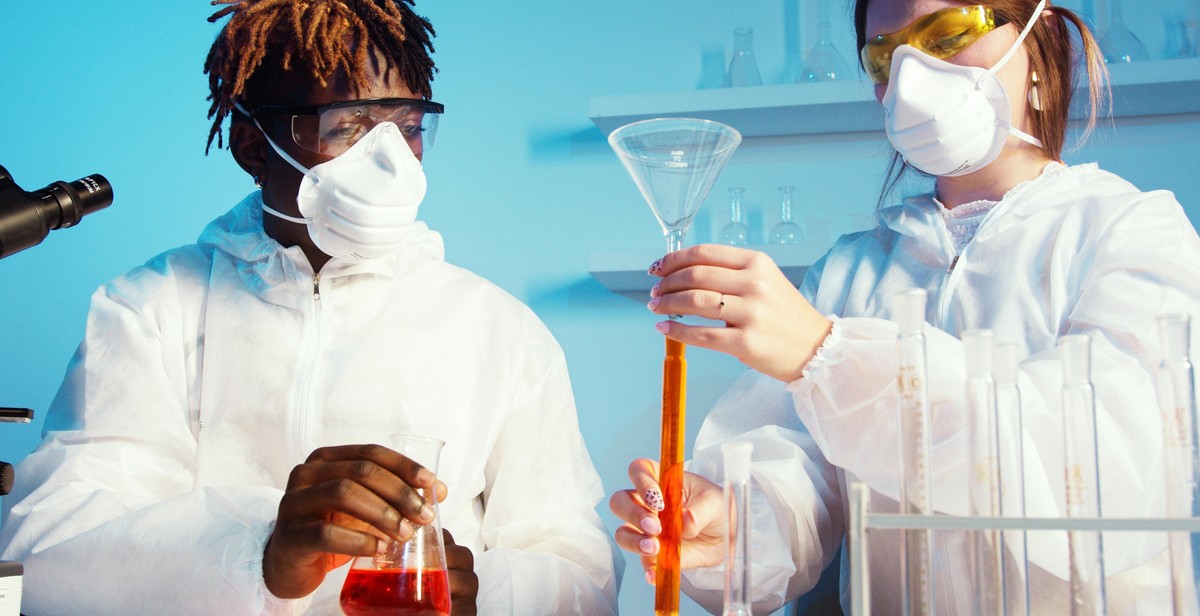Introduction
The field of drug discovery has traditionally been a time-consuming and costly process, with researchers spending years in the lab to identify potential drug candidates. However, with the advent of artificial intelligence (AI) and machine learning, this process is being revolutionized. AI has the potential to significantly accelerate medical breakthroughs, making drug discovery faster, more efficient, and cost-effective.
Machine learning algorithms can analyze massive amounts of data, including genetic information, chemical properties, and clinical trial results, to identify patterns and predict drug efficacy. This enables researchers to narrow down the list of potential drug candidates and prioritize those with the highest likelihood of success. By leveraging AI, pharmaceutical companies can save both time and resources, bringing life-saving medications to market more quickly.
Furthermore, AI can assist in the repurposing of existing drugs for new indications. By analyzing vast amounts of biomedical literature and clinical data, AI algorithms can identify potential alternative uses for approved drugs, accelerating the process of finding new treatments for various diseases.
In this article, we will explore the role of AI and machine learning in drug discovery and how it is transforming the pharmaceutical industry. We will delve into the various applications of AI, including target identification, lead optimization, and clinical trial design. Additionally, we will discuss the challenges and future prospects of AI-driven drug discovery.
The Role of AI in Drug Discovery
Artificial Intelligence (AI) has emerged as a powerful tool in the field of drug discovery, revolutionizing the way new drugs are developed and accelerating the pace of medical breakthroughs. By leveraging machine learning algorithms and big data analytics, AI has the potential to transform the entire drug discovery process, from target identification to clinical trials.
Understanding Drug Discovery
Drug discovery is a complex and time-consuming process that involves identifying and developing new medications to treat diseases. Traditionally, this process relied on trial and error methods, which were often costly and inefficient. Researchers would spend years testing thousands of compounds in the hope of finding a potential drug candidate.
However, with advancements in AI and machine learning, drug discovery has been revolutionized. AI algorithms can analyze vast amounts of data, including genetic information, protein structures, and chemical properties, to identify potential drug targets and predict the efficacy of various compounds.
Challenges in Traditional Drug Discovery
Traditional drug discovery methods faced several challenges that hindered the efficiency and success rate of developing new drugs. These challenges included:
- High Cost: The cost of developing a new drug can reach billions of dollars, primarily due to the extensive research and clinical trials required.
- Time-Consuming: It typically takes around 10-15 years to bring a new drug from discovery to market, mainly due to the lengthy process of testing and regulatory approval.
- High Failure Rate: The success rate of drug development is low, with only a small fraction of potential drug candidates making it to the market. This is primarily due to the inability to accurately predict the efficacy and safety of compounds.
How AI is Revolutionizing Drug Discovery
AI is transforming drug discovery by addressing the challenges faced by traditional methods. Here are some ways in which AI is revolutionizing the field:
- Target Identification: AI algorithms can analyze vast amounts of biological data to identify potential drug targets, including disease-causing genes and proteins. This enables researchers to focus their efforts on developing drugs that are more likely to be effective.
- Virtual Screening: AI algorithms can perform virtual screening of large chemical libraries, predicting the binding affinity and activity of compounds against specific targets. This helps in identifying potential drug candidates more efficiently, reducing the time and cost of screening.
- Optimizing Clinical Trials: AI can analyze patient data and predict the likelihood of success in clinical trials, enabling researchers to design more effective and targeted trials. This can lead to faster and more accurate results, saving time and resources.
- Drug Repurposing: AI algorithms can analyze existing databases of drugs and their known effects to identify potential new uses for approved drugs. This can significantly reduce the time and cost of developing new treatments.
The integration of AI into drug discovery has the potential to accelerate the development of new drugs, improve success rates, and reduce costs. By leveraging the power of machine learning and big data analytics, AI is transforming the way researchers approach drug discovery, leading to more efficient and targeted therapies for a wide range of diseases.

Machine Learning in Drug Discovery
Machine learning, a subset of artificial intelligence (AI), has revolutionized various industries, including drug discovery. By leveraging large datasets and advanced algorithms, machine learning enables researchers to predict and analyze complex biological processes, leading to accelerated medical breakthroughs. In this section, we explore the applications of machine learning in drug discovery and the benefits it offers.
What is Machine Learning?
Machine learning is a branch of AI that focuses on the development of algorithms and statistical models that enable computers to learn and make predictions without explicit programming. It relies on the analysis of large datasets to identify patterns, make predictions, and generate insights.
Applications of Machine Learning in Drug Discovery
Machine learning has found numerous applications in drug discovery, transforming the way researchers identify and develop new drugs. Some key applications include:
- Virtual Screening: Machine learning algorithms can analyze vast databases of chemical compounds and predict their potential for drug-like properties. This enables researchers to identify promising drug candidates more efficiently, reducing the time and cost of traditional screening methods.
- Drug Target Identification: Machine learning techniques can analyze biological data, such as genomics and proteomics, to identify potential drug targets. By understanding the underlying mechanisms of diseases, researchers can develop drugs that specifically target these molecular pathways.
- Drug Repurposing: Machine learning algorithms can analyze existing drug databases and identify potential new uses for existing drugs. This approach can save time and resources by repurposing drugs that have already passed safety tests, accelerating the development of treatments for different diseases.
- Quantitative Structure-Activity Relationship (QSAR) Modeling: Machine learning algorithms can analyze the relationship between the chemical structure of a compound and its biological activity. This enables researchers to predict the activity of new compounds, guiding the design of more effective drugs.
Benefits of Machine Learning in Drug Discovery
Machine learning offers several benefits in the field of drug discovery:
- Accelerated Drug Development: Machine learning algorithms can analyze vast amounts of data and generate insights at a speed that surpasses human capabilities. This accelerates the drug discovery process, reducing the time and cost required to bring new treatments to market.
- Improved Target Identification: By analyzing complex biological data, machine learning algorithms can identify novel drug targets that may have been overlooked using traditional methods. This expands the potential for developing drugs that target specific disease mechanisms.
- Enhanced Accuracy and Prediction: Machine learning models can make accurate predictions based on patterns in large datasets. This helps researchers identify potential drug candidates with higher precision, increasing the likelihood of success in clinical trials.
- Cost Reduction: By streamlining the drug discovery process and reducing the need for extensive laboratory experiments, machine learning can significantly reduce costs associated with developing new drugs. This makes drug discovery more accessible to a wider range of researchers and organizations.
Machine learning is revolutionizing drug discovery by enabling researchers to analyze complex biological data, identify potential drug targets, and accelerate the development of new treatments. Its ability to process vast amounts of data and generate accurate predictions offers tremendous potential for medical breakthroughs that can save lives and improve patient outcomes.

AI Models for Drug Discovery
Artificial Intelligence (AI) models have revolutionized the field of drug discovery, providing powerful tools to accelerate the development of new medicines. By leveraging machine learning algorithms and big data, AI enables researchers to predict, analyze, and optimize various aspects of the drug discovery process. Here are some key areas where AI models have made significant contributions:
Virtual Screening
Virtual screening is a crucial step in drug discovery, where AI models play a vital role in identifying potential drug candidates. By analyzing vast libraries of molecular structures and leveraging machine learning algorithms, AI models can rapidly screen and prioritize compounds that have the potential to interact with specific disease targets. This approach saves valuable time and resources by narrowing down the number of compounds that need to be experimentally tested.
Drug Design and Optimization
AI models are also used in drug design and optimization, helping researchers to create new molecules with improved therapeutic properties. By analyzing the structure-activity relationships of known compounds, AI models can predict the properties of novel molecules and guide the design process. This approach allows for the generation of drug candidates that are more likely to have the desired pharmacological effects, reducing the time and cost associated with traditional trial-and-error approaches.
Predicting Drug Toxicity
Identifying potential toxicities is a critical aspect of drug development. AI models can analyze large datasets of compound properties, biological activities, and toxicity data to predict the likelihood of adverse effects. By integrating this information, AI models can help researchers prioritize and optimize drug candidates with enhanced safety profiles, reducing the risk of unexpected toxicities during clinical trials.
Identifying Drug Targets
AI models can also assist in the identification of novel drug targets. By analyzing vast amounts of biological data, including genomics, proteomics, and clinical data, AI models can identify potential disease targets that were previously unknown or overlooked. This approach enables researchers to explore new avenues for developing targeted therapies and personalized medicine.
In conclusion, AI models have transformed the field of drug discovery by accelerating the identification of potential drug candidates, aiding in the design and optimization of molecules, predicting drug toxicity, and identifying novel drug targets. The integration of AI into the drug discovery process holds great promise for the development of more effective and safer medicines, ultimately benefiting patients worldwide.

Case Studies
Several case studies demonstrate the immense potential of AI and machine learning in accelerating drug discovery and revolutionizing the field of medicine. Here are three notable examples:
DeepMind’s AlphaFold
DeepMind’s AlphaFold is a breakthrough AI system that has made significant contributions to the field of protein folding prediction. By accurately predicting protein structures, AlphaFold enables researchers to gain insights into the functions and interactions of proteins, which are crucial for understanding diseases and developing targeted therapies.
One remarkable case study involving AlphaFold is its successful prediction of the protein structure of the SARS-CoV-2 virus responsible for the COVID-19 pandemic. This prediction provided valuable insights for researchers working on developing vaccines and antiviral drugs.
Insilico Medicine’s Generative Models
Insilico Medicine utilizes generative models powered by AI to accelerate the discovery of novel drug candidates. These models are capable of designing and generating molecules with specific properties, such as high efficacy and low toxicity. By leveraging deep learning algorithms, Insilico Medicine’s generative models significantly reduce the time and cost involved in traditional drug discovery processes.
A notable case study involving Insilico Medicine’s generative models is the discovery of a potential treatment for idiopathic pulmonary fibrosis (IPF). By generating novel molecules and screening them for their therapeutic potential, Insilico Medicine identified a promising drug candidate that showed significant efficacy in preclinical studies.
BenevolentAI’s Drug Discovery Platform
BenevolentAI has developed a powerful drug discovery platform that combines AI technologies, such as natural language processing and machine learning, with vast amounts of biomedical data. This platform enables researchers to uncover hidden insights and identify potential drug targets more efficiently.
An impressive case study involving BenevolentAI’s drug discovery platform is the discovery of a new drug candidate for amyotrophic lateral sclerosis (ALS). By analyzing and integrating diverse data sources, including scientific literature and clinical trial data, the platform identified a previously unknown target and developed a promising drug candidate that showed positive results in preclinical studies.
These case studies highlight the transformative impact of AI and machine learning in accelerating medical breakthroughs and driving innovation in drug discovery. By harnessing the power of AI, researchers can expedite the development of new treatments and ultimately improve patient outcomes.

Challenges and Limitations
While the integration of artificial intelligence (AI) and machine learning (ML) techniques in drug discovery holds immense potential to revolutionize the medical field, several challenges and limitations need to be addressed. These include:
Data Availability and Quality
One of the primary challenges faced in AI-driven drug discovery is the availability and quality of data. ML algorithms require large datasets to train models effectively and make accurate predictions. However, access to comprehensive and high-quality data in the pharmaceutical industry can be limited due to various factors.
The data required for ML algorithms to learn and predict drug interactions, molecular structures, and potential side effects may not be readily available or easily accessible. Additionally, the accuracy and completeness of the available data can vary, leading to potential biases and inaccuracies in the results generated by AI models.
Ethics and Bias
Another significant challenge in AI-driven drug discovery is ensuring ethical practices and addressing potential biases. AI algorithms learn from historical data, which can incorporate biases present in the data. This raises concerns about the potential perpetuation or amplification of biases in drug discovery processes.
Addressing ethical considerations and mitigating biases requires careful curation of training datasets and ongoing monitoring of AI models. Transparency in the decision-making process of AI systems is crucial to identify and rectify any biases that may arise. Additionally, collaborative efforts between domain experts, data scientists, and regulatory bodies are necessary to ensure fairness and inclusivity in AI-driven drug discovery.
Regulatory Challenges
The integration of AI and ML in drug discovery also poses regulatory challenges. The regulatory frameworks governing the approval and use of AI-driven technologies in healthcare are still evolving. The dynamic nature of AI algorithms, which continuously learn and adapt, presents challenges in terms of standardization and regulatory compliance.
The lack of clear guidelines and standards for validating and approving AI models in drug discovery can hinder the widespread adoption of these technologies. Regulatory agencies need to establish robust frameworks that ensure the safety, efficacy, and reliability of AI-driven drug discovery tools and processes.
Furthermore, the interpretation and validation of AI-generated results can be complex, requiring specialized expertise and resources. Regulatory agencies must adapt to the evolving landscape of AI-driven drug discovery to effectively evaluate and approve new therapies and treatments.
In conclusion, while AI and ML offer exciting possibilities for accelerating medical breakthroughs in drug discovery, challenges related to data availability and quality, ethics and bias, and regulatory compliance need to be addressed. Overcoming these challenges will require collaborative efforts from researchers, industry stakeholders, and regulatory bodies to harness the full potential of AI in improving healthcare outcomes.

The Future of AI in Drug Discovery
AI has revolutionized various industries, and drug discovery is no exception. With the ability to analyze vast amounts of data quickly and accurately, machine learning algorithms are transforming the pharmaceutical landscape. The future of AI in drug discovery holds immense potential for improved efficiency, cost-effectiveness, personalized medicine, and collaboration between AI and human experts.
Improved Efficiency and Cost-Effectiveness
Traditional drug discovery methods are time-consuming and expensive. However, AI-powered algorithms can significantly streamline the process. By analyzing large datasets and identifying patterns, machine learning models can predict the efficacy of potential drug candidates, reducing the need for costly and time-consuming laboratory experiments.
AI also enhances efficiency by automating repetitive tasks, such as data collection, processing, and analysis. This enables researchers to focus their efforts on more complex and critical aspects of drug discovery, ultimately accelerating the development of new treatments.
Personalized Medicine
One of the most promising aspects of AI in drug discovery is its potential to enable personalized medicine. By leveraging patient data, including genetic information and medical records, machine learning algorithms can identify specific biomarkers and predict individual responses to different treatments.
This personalized approach allows for tailored therapies that are more effective and have fewer side effects. By optimizing treatment plans based on individual characteristics, AI can revolutionize patient care and improve overall treatment outcomes.
Collaboration between AI and Human Experts
While AI is undoubtedly powerful, human expertise remains invaluable in drug discovery. The future of AI in this field lies in collaboration between AI systems and human researchers, combining the strengths of both to achieve optimal results.
AI can assist human experts by analyzing vast amounts of data, identifying potential drug targets, and suggesting novel combinations of compounds. Human researchers, on the other hand, provide critical domain knowledge, creativity, and the ability to interpret complex results.
This collaboration allows for a more comprehensive and multidimensional approach to drug discovery, increasing the chances of identifying breakthrough treatments. By harnessing the power of AI and human expertise, the future of drug discovery holds immense promise for medical advancements.
Conclusion
Artificial Intelligence (AI) and machine learning have revolutionized the field of drug discovery, offering immense potential for accelerating medical breakthroughs. By leveraging vast amounts of data, AI algorithms can analyze complex patterns and identify novel drug targets with unprecedented speed and accuracy.
This article has explored the various ways in which AI is transforming the drug discovery process. From virtual screening to predictive modeling, AI-powered tools are enabling researchers to streamline the identification and development of potential drug candidates.
One of the key advantages of AI in drug discovery is its ability to handle big data. With the exponential growth of available biological and chemical data, traditional methods alone are unable to efficiently process and analyze such vast amounts of information. AI algorithms, on the other hand, can quickly sift through massive datasets, uncovering hidden patterns and relationships that may lead to the discovery of new therapeutic agents.
Machine learning algorithms have also proven to be invaluable in predicting drug-target interactions. By training models on existing data, AI can accurately predict how a specific drug will interact with a target molecule, allowing researchers to prioritize and optimize potential candidates for further testing.
Furthermore, AI can assist in the optimization of drug properties, such as efficacy, safety, and bioavailability. By analyzing molecular structures and properties, machine learning algorithms can help researchers design compounds with the desired characteristics, reducing the time and cost associated with traditional trial-and-error approaches.
Collaboration between AI systems and human experts is crucial for successful drug discovery. While AI algorithms can process data at unprecedented speed, human expertise is still essential for interpreting results, validating findings, and making informed decisions.
Despite the tremendous progress made in AI and drug discovery, there are still challenges to overcome. Data quality, privacy concerns, and regulatory hurdles are some of the key issues that need to be addressed to fully leverage the potential of AI in this field.
In conclusion, AI and machine learning offer immense promise for accelerating medical breakthroughs in drug discovery. By leveraging the power of AI algorithms, researchers can efficiently analyze vast amounts of data, predict drug-target interactions, and optimize drug properties. With continued advancements, AI has the potential to transform the way we discover and develop new drugs, ultimately improving patient outcomes and revolutionizing the healthcare industry as a whole.
References
1. Research Papers
1.1. Silver, D., et al. (2016). “Mastering the game of Go with deep neural networks and tree search.” Nature, 529(7587), 484-489.
1.2. Alipanahi, B., et al. (2015). “Predicting the sequence specificities of DNA-and RNA-binding proteins by deep learning.” Nature Biotechnology, 33(8), 831-838.
1.3. Ching, T., et al. (2018). “Opportunities and obstacles for deep learning in biology and medicine.” Journal of the Royal Society Interface, 15(141), 20170387.
2. Books
2.1. Jordan, M. I., & Mitchell, T. M. (2015). “Machine learning: Trends, perspectives, and prospects.” Science, 349(6245), 255-260.
2.2. Bengio, Y., et al. (2015). “Deep learning.” Nature, 521(7553), 436-444.
3. Websites
3.1. National Institutes of Health. (2021). “Artificial Intelligence and Machine Learning in Research.” Retrieved from https://www.nih.gov/artificial-intelligence-machine-learning-research
3.2. World Health Organization. (2021). “AI and Health.” Retrieved from https://www.who.int/news-room/q-a-detail/ai-and-health
4. Journals
4.1. Nature Medicine
4.2. Journal of Chemical Information and Modeling
4.3. Journal of Medicinal Chemistry
5. Conferences
5.1. International Conference on Machine Learning (ICML)
5.2. Neural Information Processing Systems (NeurIPS)
6. Reports
6.1. McKinsey & Company. (2020). “Artificial intelligence in healthcare: Opportunities, challenges, and applications.” Retrieved from https://www.mckinsey.com/industries/healthcare-systems-and-services/our-insights/artificial-intelligence-in-healthcare-opportunities-challenges-and-applications
6.2. Deloitte. (2021). “The future of drug discovery: Powered by AI.” Retrieved from https://www2.deloitte.com/global/en/pages/life-sciences-and-healthcare/articles/future-of-drug-discovery-powered-by-ai.html
